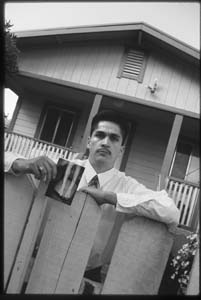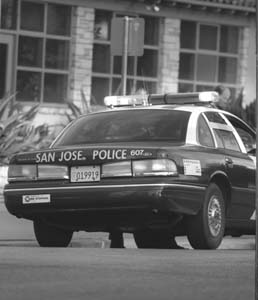![[Metroactive News&Issues]](/gifs/news468.gif)
[ Metro | Metroactive Central | Archives ]
Law and Disorder
 Unnecessary Roughness: Norberto Cisneros insisted for a year that police started the violence that left him injured at his family's New Year's Eve party. A jury recently found him innocent of all charges. The original story can be viewed online.
Unnecessary Roughness: Norberto Cisneros insisted for a year that police started the violence that left him injured at his family's New Year's Eve party. A jury recently found him innocent of all charges. The original story can be viewed online.File Photo by Christopher Gardner
The conduct of the SJ police department comes under close scrutiny as victims' cases make their way through the courts By Cecily Barnes A YEAR AGO LAST MONTH, Norberto Cisneros woke up in the criminal detention unit of Valley Medical Center with a split shinbone, bloodied urine and an implausible story. The 31-year-old father of three said that on the previous night a half-dozen San Jose police officers crashed his family's New Year's Eve party, attended by elderly relatives and children in his working-class Latino neighborhood. Officers approached party-goers on the front lawn and demanded to speak to the man of the house; when Cisneros stepped forward, he said, they beat him with nightsticks in his own front yard. Then, amid the screams and protests of his wife and 11-year-old son, they dragged him to a police car and took him away. The police, responding to a report of "gang activity" that night, claimed Cisneros was drunk, belligerent and violent. They said they acted in self-defense and used necessary force to restrain him. They arrested him on two counts of assaulting an officer and on one count of resisting arrest. That the cops and a suspect would have different versions of the same event is not unusual. But early this month, Cisneros retold his tale to 12 men and women legally required to listen, and something out of the ordinary happened. They believed him. On Jan. 22, the 12-member Municipal Court jury presided over by Judge Ralph Brogdon acquitted Cisneros of the three charges levied against him by police. The verdict: Cisneros did not assault the officers and he did not resist arrest. Or rather, as deputy district attorney Robert Tashjian carefully points out, it could not be proven beyond a reasonable doubt that he did these things. Evidence presented by the defense indicated that police had gone to the Cisneros address in error, while the real gang fight was going on blocks away. And days after Cisneros was found not guilty of inciting the violence that transpired last New Year's Eve, Cisneros sued the city of San Jose and the officers involved in federal court seeking damages of $2.5 million. According to his attorney, Stuart Kirchick, the civil suit seeks damages on the grounds of excessive force, false arrest, assault and battery, infliction of emotional distress, malicious prosecution and trespass.
"I think it's an absolutely incredible story that veteran police officers would pull this person out of his yard and strike him in front of a big crowd for absolutely no reason," Tashjian says. "There's a lack of motive on the part of the officers, and I just don't think it's a plausible story." Stuart Kirchick, who presented evidence that police were pumped up to break up a gang altercation in a rough Latino neighborhood when they mistakenly arrived at the Cisneros residence, responds bluntly to Tashjian's disbelief in his client's story. "He's naive." Kirchick says. "He's the 13th juror and he's all alone." Over the past year, Cisneros has stuck firmly to his story and tried desperately to tell anyone who would listen. He phoned newspapers and TV stations, with Police Chief Bill Lansdowne and lodged official complaints with the FBI, the Independent Police Auditor and the San Jose Police Department's Professional Standards and Conduct Unit. In response, the FBI and SJPD sent letters stating that the police acted within their bounds. Five months before the trial the police department's own Professional Standards and Conduct Unit determined the officers' actions had been "justified, lawful and proper." Since the outcome of the trial, however, San Jose's independent police auditor, Teresa Guerrero-Daley, has asked that Cisneros' case be reopened in light of the new evidence. Chief Lansdowne met face-to-face with Cisneros last week and agreed to personally review the case, and attorneys with the city of San Jose will be looking into the matter in response to the civil suit. "Anytime we get a civil suit or a court case, I go back and look at it," Lansdowne says. "I am going to get a copy of the [court] transcripts and then Teresa [Guerrero-Daley] and I are going to get together and take a look at it." The timing of the acquittal, civil rights lawsuit and reopened internal investigation could not be better for Cisneros or worse for the San Jose Police Department. Just as Cisneros' story begins to gain some credibility, several organizations in the community have come forward with backlogged reports of other police-brutality incidents. And former members of the Santa Clara County civil grand jury, who were dismissed when the group disbanded Dec. 28, have gone public with accusations about racism, police brutality and other matters they say went uninvestigated. Two weeks ago, leaders of the National Association for the Advancement of Colored People (NAACP) met with Chief Bill Lansdowne to discuss nearly 15 alleged incidents of police brutality. According to NAACP leader Darryl Williams, the complaints rushed in after the Santa Clara County grand jury dissolved. "After the grand jury disbanded we received 100 complaints, and about 15 were police-type matters," Williams says. "We will take steps to getting actual resolve in these incidents." The NAACP has joined forces with five of the dissident grand jurors, the ACLU and members of the community to form a watchdog group it calls the Citizen's Tribunal. Members of the tribunal will monitor and investigate the police, courts and other government institutions, making recommendations and public announcements. At the first meeting Jan. 29, nearly one hundred people showed up at the African American Community Center in San Jose to find out what the new Citizen's Tribunal was all about. WHILE POLICE might have been hoping for a swift end to Cisneros' vocal allegations of brutality, the timing of his acquittal suggests that quite the opposite is likely to happen. Along with the suit filed by Cisneros, a civil suit was filed early last week by the family of Victor Duran, a young San Jose man who died following his arrest by the SJPD. Both cases indicate that the San Jose Police Department is increasingly drawing a brighter spotlight. And the Cisneros case, strengthened by his acquittal, may be only the beginning. If the police officers' use of force against Cisneros was not in self-defense, then why? The district attorney's office is quick to point out that an acquittal for Cisneros does not equate with guilt on the part of the officers. "Legally the jury doesn't make a decision that the officers used excessive force or didn't, they just make a determination that Mr. Cisneros' case wasn't proven beyond a reasonable doubt," says assistant district attorney Dave Davies, who prosecutes most of the county's cases against law enforcement officials. Still, NAACP leader Darryl Williams says that in this case and in others, he intends to find out not just who is innocent, but also who is guilty. The Citizen's Tribunal will track complaints and look for the names of officers that reappear again and again. "Our goal would be to remove that individual from the force," Williams says. "If we don't weed out the individuals who are doing this, we haven't gained anything." Because police officers hold one of the few jobs that permit the use of force and it's extremely difficult to convince a jury that they crossed the line, the DA rarely prosecutes these cases. Between 1991 and 1996 only nine law-enforcement officials countywide were convicted of unnecessary use of force, says Davies. By comparison, 154 complaints of unnecessary force were filed with San Jose's independent police auditor, Teresa Guerrero-Daley, last year alone. "They're difficult cases to prosecute in the sense that they always involve issues of reasonable force and self- defense on the part of the officer," says Davies. "Those are areas of the law where only a reasonable doubt needs to be raised to acquit the officer." NORBERTO CISNEROS did not attend the Citizen's Tribunal's first meeting last Friday, but dozens of others with similar stories to tell did. One man described how he was kept in jail for nine days without a phone call or the proper legal rights. Another woman told of an African American teenager she knew who was arrested for being under the influence of marijuana when he was actually taking NyQuil. Others told stories of being stopped and harassed by the police, they said, just because of their race. Although none of the tales have been corroborated, leaders of the Citizen's Tribunal say they intend to look into each story and hold police accountable for the ones that stand on strong evidence. Former grand juror Jessica Lloyd-Rogers explained two programs that the Citizen's Tribunal will recruit for immediately--"court watch" and "cop watch." In the first, individuals volunteer to observe court proceedings and document any racist or unjust comments. In the "cop watch" program, people observe arrests when they occur on the street and ask for the officer's badge number if it seems that the arrest was handled inappropriately. Where all this will lead remains to be seen, but Williams and Lloyd-Rogers say that they've already spoken with Attorney General Bill Lockyer, Police Chief Lansdowne and other leaders throughout the state. "Stay close with us," Williams says, "because we're going to the top."
The Citizen's Tribunal's next meeting is scheduled for Feb. 11 at 7pm at the African American Community Center at 304 N. Sixth St. [ San Jose | Metroactive Central | Archives ]
|
From the February 11-17, 1999 issue of Metro.
Copyright © Metro Publishing Inc. Maintained by Boulevards New Media.
 DURING THE TRIAL, no one disputed that Cisneros was severely beaten by nightsticks in front of his own house. Photographs, medical reports and even police testimony given during the jury trial confirm this fact. There was no question that it was police who administered the beating, a fact that they willingly conceded during the trial. Less certain, however, were the events leading up to the beating.
DURING THE TRIAL, no one disputed that Cisneros was severely beaten by nightsticks in front of his own house. Photographs, medical reports and even police testimony given during the jury trial confirm this fact. There was no question that it was police who administered the beating, a fact that they willingly conceded during the trial. Less certain, however, were the events leading up to the beating.